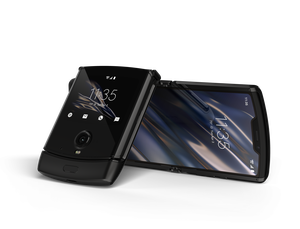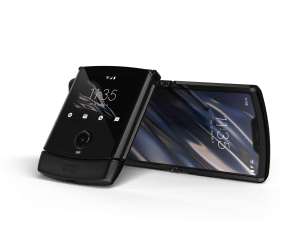The rebirth of the Razr has been rumored for several months now. And honestly, such a product is a bit of a no-brainer. The Lenovo-owned company is embracing the burgeoning (if sputtering) world of foldables with the return of one of its most iconic models.
While it’s true that Motorola’s kept the Razr name alive in some form or another well into the Android era, everything that’s come since has failed to recapture the magic of the once mighty brand.
From the looks of things, however, the newly announced Razr is a lovely bit of symmetry. The product, which was announced earlier today in Los Angeles, leans into the lackluster criticism that foldables are simply a return of the once-ubiquitous clamshell design.
According to Motorola, the company has been toying around with flexible technology for some time now. Per a press release: “In 2015, a cross functional team, comprised of engineers and designers from both Motorola and Lenovo, was assembled to start thinking about how we could utilize flexible display technology.”
The device swaps the horizontal design of its best known competitor, the Samsung Galaxy Fold. The vertical form factor looks to be a match made in foldable heaven. Certainly it loses some of the uber-thin design that made the original Razr such a hit so many years back, but makes the ultra-wide (21:9) 6.2-inch screen compact enough to fit in a pocket.
As with the Galaxy Fold, there’s another a small display on the front for getting a glimpse of notifications and the like. It’s another design feature that mirrors the O.G. Razr. Predictably, the device runs Android — Android 9 (for now), to be precise.
For full throwback appeal, there’s also a “Retro Razr” mode, that mimics the original metallic button design for the bottom half of the screen. It’s a skin that does, indeed, double as a number pad, usable with Android messaging app. Motorola clearly put a lot of love into the design and it shows. If nothing else, the new Razr could go a ways toward proving that retro handsets can be more than just nostalgic novelty for bygone tech.
After the whole Samsung kerfuffle, you’d be right to question the device’s durability, though Motorola says it’s less concerned, citing an “average” smartphone timespan for the product. Only one way, to find out, I guess. Also like the Fold, price is a pretty big obstacle to any sort of mainstream adoption for this first-gen product. The Razr will run $1,499 when it launches in January of next year.












